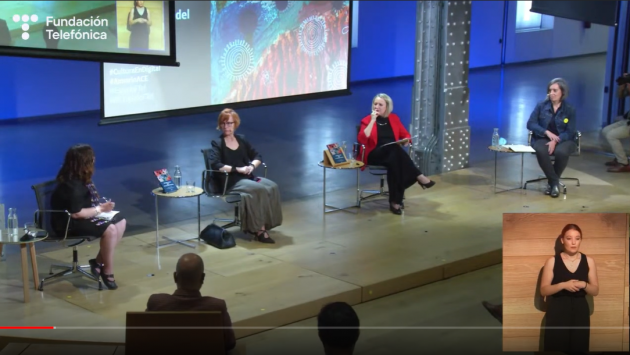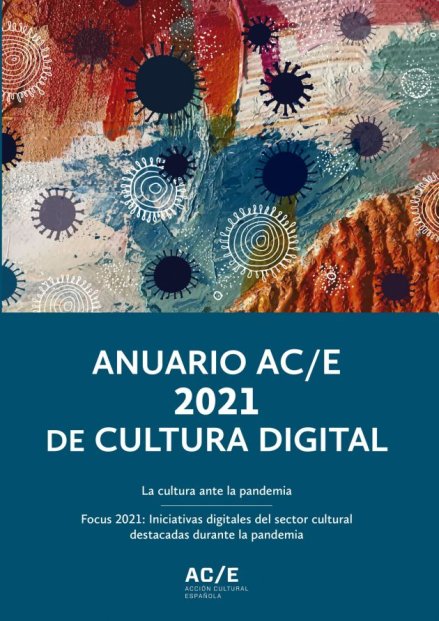The presentation will take place at the Fundación Telefónica Space on May 26, 2021, within the framework of the Culture Digitization Forum.
To attend you can subscribe here>
All in-person attendees will be able to pick up the Report in printed format.
This event will be interpreted to LSE, it can be followed in streaming on Espacio Fundación Telefónica website and on networks with the hashtag #AnuarioACE and #CulturaEnDigital.
Access to the digital book will be available from the 26th in the morning here>
10.00 a.m. to 10.30 a.m. ARRIVAL OF THE PUBLIC AND SPEAKERS.
10.30am to 10.40am WELCOME AND PRESENTATION OF THE MEETING
Espacio Telefónica Director
President of Acción Cultural Española
10.40 a.m. to 11.40 a.m. PANEL 1: CULTURAL INSTITUTIONS IN THE FACE OF THE PANDEMIC: OPPORTUNITIES AND CHALLENGES
Mar Pérez Morillo, Director of the Digital Processes and Services Division of the National Library of Spain.
Reyes Carrasco, Head of the collections area of the General Sub-Directorate of State Museums, Ministry of Culture and Sports.
Fefa Noia, Deputy Director of the National Dramatic Center.
Moderator: Isabel Izquierdo, Programming Director of Acción Cultural Española (AC / E).
11.40 a.m. to 12.00 p.m. PAUSE
12.00 p.m. to 13.00 p.m. PANEL 2: CULTURE ON THE SCREENS
Roger Casas-Alatriste, CEO El Cañonazo Transmedia.
Geraldine Gonard, Director of the Conecta Fiction Festival and Feel Content.
Joaquín Rodríguez, Director of the Máster in Edition at the University of Salamanca, and of the magazine Archipiélago.
Moderator: Javier Celaya, Academic Director of the AC / E Yearbook, founding partner of Dosdoce.
13.00 p.m. CLOSING
The AC/E Digital Culture Annual Report 2021 edition consist of essays and a success case study where professionals and specialists analyse how digital technologies have been implemented in various fields of culture (visual arts, film, music, performing arts, books and heritage) to address the “new reality” that has emerged in the wake of the COVID-19 pandemic. The experts’ conclusions include short- and medium-term forecasts and suggestions regarding which of the new tools and processes that we have learned to use as a result of this crisis ...
The first part of the 2021 edition consists of essays by professionals and specialists, who analyse how digital technologies have been implemented in various fields of culture (visual arts, film, music, performing arts, books and heritage) to address the “new reality” that has emerged in the wake of the COVID-19 pandemic. The experts’ conclusions include short- and medium-term forecasts and suggestions regarding which of the new tools and processes that we have learned to use as a result of this crisis are here to stay.
Focus 2021: Significant digital initiatives of the culture sector during the pandemic
brings together and analyses the best practices related to the use of new technologies by various national and international cultural organizations that have been striving to ensure the continuing presence of culture in our lives even during the strictest lockdowns. Culture professionals will find an extensive description of the most innovative applications of new technologies to facilitating access to culture. These ideas were put into practice during the restrictions imposed by lockdown and the new health situation but look set to become permanent tools that can complement the activities of any cultural organization in the future by helping reach more audiences through technology.
There are no manuals that can explain in detail how to use new technologies in the most optimal way during this or future pandemics and confinements, but we can describe exemplary cases and specific examples of good practices from which to start.
In a certain sense, the “new normal” opens up a whole new field for us to discover new ways of accessing culture, new paths through which to travel; each with the ability to experiment and be creative with these new tools, mixing lifelong formulas and new methods in order to achieve the goal we seek.
The presentation will take place at the Fundación Telefónica Space on May 26, 2021, within the framework of the Culture Digitization Forum organized by the Fundación Telefónica.





